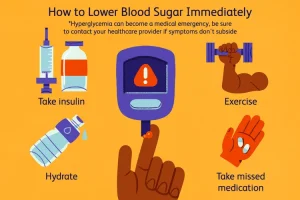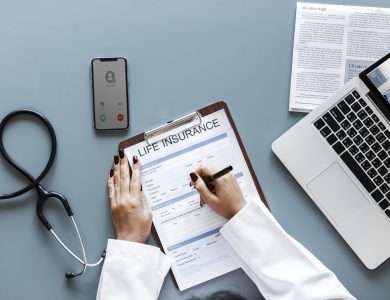How to Lower Your Blood Sugar Quickly
How to Lower Blood Sugar Quickly: Effective Strategies
When you have type 1 or type 2 diabetes, managing blood sugar levels can be challenging, especially during periods of severe hyperglycemia (dangerously high blood glucose). If not addressed quickly, high blood sugar levels can lead to serious, life-threatening complications. Here are some effective strategies to help lower your blood sugar fast:

1. Take Insulin
The fastest and most effective way to lower blood sugar quickly is by taking rapid-acting insulin such as Humalog, Novolog, or Apidra. If you have a type 1 diabetes insulin pump, you can use it to administer a correction dose.
It’s important to note that slow-acting insulin, such as NPH insulin, takes several hours to start working and is not ideal for urgent situations.
How Insulin Works:
Insulin helps move glucose from your blood into your cells, where it can be used for energy or stored for later use. If your body isn’t producing enough insulin (type 1 diabetes) or isn’t using it efficiently (type 2 diabetes), your blood sugar can rise to unsafe levels, leading to complications like diabetic ketoacidosis (DKA) or hyperosmolar hyperglycemic state (HHS).
Tip: After taking insulin, wait 15–30 minutes and check your blood sugar again to see how much it’s dropped. Avoid re-dosing too soon, as rapid insulin can cause hypoglycemia (low blood sugar) if you take too much.
2. Intramuscular Injections
Injecting insulin directly into a muscle can speed up its absorption, potentially lowering your blood sugar faster. However, this can also increase the risk of hypoglycemia and cause insulin overdoses, which can be fatal.
Consult Your Healthcare Team:
Before trying intramuscular injections, speak with your healthcare provider. They can guide you on the correct technique and determine if it’s appropriate for your situation.
3. Take Missed Medications
If you’ve missed a dose of your diabetes medication, it may contribute to a rise in blood sugar levels. Many medications work best when taken before meals, but if you’ve missed one, it can affect your glucose control.
Medications that Lower Blood Sugar Quickly:
-
Meglitinides: Nateglinide and Repaglinide
-
Sulfonylureas: Diabinese (Chlorpropamide), Amaryl (Glimepiride), Glucotrol (Glipizide), Glynase (Glyburide)
Tip: If you miss a dose, take it as soon as you remember, but do not double up on doses. Check with your healthcare provider for specific advice regarding missed doses.
4. Exercise
Physical activity is an excellent way to lower blood sugar levels naturally. Exercise helps your body use glucose for energy, lowering insulin resistance and improving blood sugar control.
How Exercise Helps:
-
Muscle contractions during exercise pull glucose from the bloodstream and use it for energy.
-
Exercise can lower your blood sugar for up to 24 hours, helping with long-term management.
-
Regular exercise also helps improve insulin sensitivity, meaning your body uses insulin more effectively.
Tip: If your blood sugar is above 240 mg/dL, test for ketones in your urine. If ketones are present, avoid exercise as it can further increase blood sugar levels and increase the risk of diabetic ketoacidosis (DKA).
5. Treat Low Blood Sugar
If your blood sugar is low (hypoglycemia), it’s important to treat it immediately to avoid dangerous symptoms.
-
BGL between 55 mg/dL and 69 mg/dL: Consume 15 grams of carbohydrates and check your blood sugar again after 15 minutes.
-
BGL below 55 mg/dL: Call 911. If available, inject Glucagon (glucagon hydrochloride). If the person is conscious, provide juice or soda, followed by carbohydrates and protein (e.g., cheese and crackers).
6. Check Ketones Before Exercising
Before starting physical activity, always check your blood sugar and ketone levels. If your blood sugar is above 240 mg/dL, checking for ketones is essential. Elevated ketone levels during exercise can worsen hyperglycemia and increase the risk of DKA.
Common Causes of Hyperglycemia
Several factors can contribute to high blood sugar in people with diabetes, including:
-
Eating too many carbohydrates
-
Insufficient physical activity
-
Illness or infection
-
Taking corticosteroids (like prednisone)
-
Skipping or not taking enough glucose-lowering medications
Summary
If you experience a significant rise in blood sugar levels, act quickly to bring it down and prevent dangerous complications. The best methods include using insulin, exercising, and taking any missed medications. Always work closely with your healthcare provider to understand the best course of action based on your specific needs.




